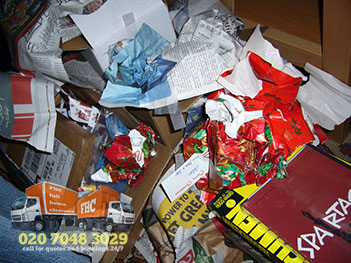Modern consumer society produces excessive amounts of waste, sometimes without even realising it. Minimising waste is one of the most important aspects of dealing with it effectively. Rubbish recycling and reuse policies and practices are indeed effective, but only up to a point. In many cases, recycling and reuse systems simply don’t have the capacity to cope with the amount of waste they need to process. Waste reduction on all levels is one of the ways to make everything more efficient. Waste reduction should be addressed serious by both (manufacturing) industry and the consumer society. In other words a hierarchical system of waste minimisation should be developed and implemented across the board.
At industrial level
- Product manufacturers should consider less packaging for their products. Innovative packaging materials and technologies allow for fewer materials required for the same effective packaging without compromise on protection or marketing of their products;
- If reduction of packaging is not a feasible option, then manufacturers should consider using sustainable or recycled products for their packaging, or materials which are easily recycled and reused;
- Manufacturers can benefit from encouraging and educating their customers on use and consumption of eco-friendly products in recyclable packaging, or packaging made of responsible/sustainable sources;
 Waste reduction at industrial level does come at a cost, and usually requires serious investment and financing. However the long term benefits and savings of undergoing one such process are undeniable and likely to improve the company’s market presence and customer recognition in the future.
Waste reduction at industrial level does come at a cost, and usually requires serious investment and financing. However the long term benefits and savings of undergoing one such process are undeniable and likely to improve the company’s market presence and customer recognition in the future.
Some other methods proven to reduce industry (manufacturing) waste are:
- Use of renewable materials supplied by responsible/sustainable sources – a trend becoming ever more popular in the food and clothing industry;
- Immediate reuse of leftover/scrap production materials – recycling and reusing leftover manufacturing supplies prevents them becoming waste;
- Quality control – overseeing that reuse and recycling procedures and regulations at manufacturing sites are actually observed and followed, this could be done internally or externally (including government appointed controllers);
- Waste exchange – this is a manufacturing system in which waste generated by the production of goods is fed as production material for the making of other products i.e. no waste.
At household level
- Buying in bulk as opposed to buying separately packaged goods and products;
- Choosing goods and products manufactured of recycled materials, or contain recycled materials in their packaging;
- Observing and following local rubbish removal and disposal regulations imposed by municipal authorities;
- Implementation of home composting systems, reduction of unnecessary consumption and wasteful use;
Waste reduction can be a challenging habit to develop and practice. But local and national governments can also help educate and encourage households and individuals make the most of their waste reduction efforts. Locally run awareness programs can help a great deal in reducing domestic rubbish, or at least make waste management more efficient through more adequate waste separation and recycling practices. Running programs and informing the public can also be done with the help of locally based manufacturing industry, especially if they happen to be major employers in the given area or region.



